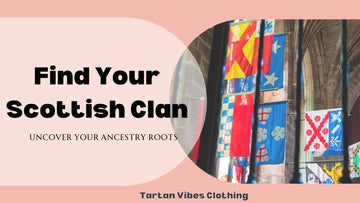How to Find Your Scottish Clan: A Comprehensive Guide to Tracing Ancestral Links
by Marcus Harris on Mar 08, 2024
Table of Content
What is a Scottish Clan?
When you hear the word "clan," it may conjure images of tartans, bagpipes, and the rolling highlands of Scotland. But what exactly is a Scottish clan? A clan is much more than just a group of individuals sharing the same name; it's a complex tapestry woven from centuries of Scottish history.
The term "clan" comes from the Gaelic word "clann," meaning "children" or "family." Historically, a Scottish clan was a community that was both territorially and genealogically linked, often led by a chieftain. These clans were social units that provided members with protection and support in the often tumultuous landscape of Scottish history. Each clan had its own distinct tartan patterns, crest, and motto, representing the familial bond and shared heritage of its members.

Clans in Historical Context
The clan system has its roots in the early Middle Ages, flourishing during the 12th to the 18th centuries. Clans controlled land and had influence over politics, trade, and social affairs. The clan chieftain held significant power, often acting as a ruler and protector of the clan's members.
Kinship and Allegiance
Kinship within the clan was not always based on blood relations. It was common for unrelated individuals to pledge allegiance to a clan for mutual benefits, thus becoming 'septs' or adherents of the clan. This allegiance was the bedrock of a clan's strength, often evaluated by the number of warriors it could muster.
The Cultural Legacy of Clans
Today, the clan system no longer holds the same societal power, but it continues to be a cherished part of Scotland's heritage. Modern clan organizations work to preserve the history and traditions, and for many people around the world, discovering their ancestral clan is a meaningful way to connect with their Scottish roots.
The Importance of Your Clan Name
Your surname can be a key to unlocking a rich tapestry of history and belonging. In Scotland, certain surnames are associated with specific clans, and finding out your clan name can link you to a lineage that stretches back centuries.
Surname as a Historical Marker
In Scottish culture, a surname often indicates which clan you belong to. This name can reveal stories of your ancestors' lives, the lands they called home, and the battles they may have fought in. It's a piece of history that you carry with you—a connection to a lineage of chieftains, warriors, and families that have shaped Scotland's past.
Cultural Pride and Identity
Carrying a Scottish clan name goes beyond having a mere label; it is a source of pride and a symbol of cultural identity. For the Scottish diaspora, a clan name is a reminder of their ancestral homeland, often celebrated through participation in Highland games, clan gatherings, and other cultural activities.
Connecting Generations
Knowing your clan name also serves as a bridge between the past and the present, connecting generations over time. It's not just about looking back; it's about preserving a legacy for future generations. As families spread across the globe, the clan name remains a constant, a way to keep the narrative of your family's history alive.
How to Find Your Scottish Clan
Discovering your Scottish clan can be an exciting journey into your family's past, and with today's resources, it's more accessible than ever before. Whether you're starting with just a surname or you have a trove of family stories, the following steps can guide you in uncovering your clan connections.

Start with Family Records
Begin your quest by gathering as much information as possible from family records. Birth certificates, marriage licenses, death certificates, and old letters can reveal names and places that are integral to your search. Oral histories from older relatives are also invaluable; they can provide personal accounts and details not found in official records.
Online Genealogy Resources
The internet is a treasure trove of genealogical data. Websites like Ancestry.com, ScotlandsPeople, and FamilySearch offer extensive records and databases that can help piece together your family tree. Online forums and social media groups focused on Scottish genealogy are also excellent places to seek guidance and share information.
DNA Testing
Genetic testing services have become a popular tool for tracing lineage and can provide clues about your clan heritage. DNA results can link you to others with shared ancestry and may even pinpoint specific regions of Scotland where your ancestors lived.
Clan Societies and Historical Records
Many Scottish clans have official societies that maintain historical records and assist members in tracing their lineage. Reach out to these organizations for help in confirming your clan. Libraries, historical societies, and local archives in Scotland can also provide records that are not available online.
Investigate Clan Symbols and Tartans
Each Scottish clan has its own unique symbols, including tartans, badges, and crests. Researching these can sometimes lead to the identification of your clan, especially if you have heirlooms or family artifacts bearing these symbols.
By following these steps and utilizing the wealth of resources available, you can make significant progress in finding your Scottish clan. The journey may take time and effort, but the personal connection to your heritage that it brings is often well worth it.
Engaging with Your Clan Community
Once you've confirmed your Scottish clan, there are numerous ways to engage with your newfound community. Many clans have societies and associations that welcome new members, offering resources, organizing events, and providing platforms to connect with fellow clan members.
Joining Clan Societies
Clan societies are at the heart of clan activities. They often have newsletters, websites, and social media pages where members can stay informed about clan news and events. Joining your clan's society is a great first step in becoming an active clan member.
Attending Clan Gatherings and Highland Games
Clan gatherings, both in Scotland and around the world, are fantastic opportunities to meet other clan members, learn about your shared history, and participate in traditional Scottish events. The Highland Games, which feature athletic competitions, dancing, and piping, often include clan tents where you can meet and celebrate with your kin.
Visiting Clan Lands and Historical Sites
Traveling to Scotland to visit the lands historically associated with your clan can be an enlightening experience. Walking the same ground as your ancestors and visiting sites significant to your clan's history can create a tangible connection to your heritage.
Wearing Clan Tartans and Symbols
Embracing your clan's tartan is a way to publicly celebrate your Scottish roots. Whether it's wearing a kilt, scarf, or simply a tartan tie, it's a symbol of pride and solidarity with your clan.

Conclusion
The journey of discovering and engaging with your Scottish clan heritage is a continuous one. It strengthens not only your personal identity but also contributes to the wider narrative of Scotland's history. As you wear your tartan with pride, remember that you are part of a lineage that has survived and thrived through the ages.
We hope this guide has illuminated the path to discovering your Scottish clan and highlighted the advantages of embracing this unique aspect of your identity. Start searching for garments and accessories featuring the distinctive tartan patterns of your clan. Let us assist you in spreading pride in your lineage and celebrating your ancestral heritage.
Frequently Asked Questions
How many Scottish clans exist, and are new clans ever recognized?
There are several hundred Scottish clans and families recognized today. New clans are not typically recognized in modern times as clans are historical entities, but new family societies and associations related to these clans may form.
What is the role of a clan chief in contemporary times?
The clan chief acts as the representative and figurehead of the clan. They often preside over clan gatherings, represent the clan at official events, and play a role in promoting Scottish culture and heritage.
Are there any extinct Scottish clans and what happens to their heritage?
Some clans no longer have living chiefs or formally organized societies, which can lead to them being considered 'dormant' or extinct. Their heritage is preserved through history books, museums, and by enthusiasts who continue to research and celebrate their legacy.
How can I support Scottish clan businesses and products?
Look for clan-certified products, shop at Scottish heritage stores, or buy directly from Scotland-based businesses that are clan-affiliated or support Scottish traditions.



